Hey! Want to learn about the bakari japanese grammar rule?
Well, there are a few uses that you’ll pick up here. Bakari is used for…
- Saying you just did something
- Expressing habitual actions like sleeping in on Saturdays
- Saying there are only certain things somewhere…
- Saying someone always does something
- Expressing approximation of size or amount
- And as a casual form.
Now that you have a quick idea of how the bakari Japanese grammar is used… and have general impression, let’s get into the specifics.
Here are the 6 types of rules for Bakari grammar usage.
Rule #1 Just Did Verb — (Past Tense Verb) ta-bakari
“Linguajunkie (that’s me) just finished writing this article.”
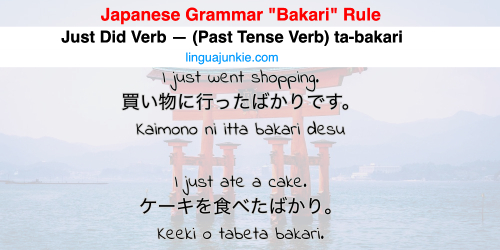
The “Vたbakari” form is a useful way to say that you just or already did something. For example, if you already ate and someone offers you food, you’d say “I just ate,” right? So, that’s where the Japanese bakari grammar rule comes in.
To use this grammar pattern, you need to take a past tense form for the verb and add bakari. For example, the past tense form of the erb 食べる (taberu) would be 食べた (tabeta). Then, add bakari to make the sentence 食べたばかり (tabeta bakari) meaning “I just ate”. So, remember it as “ta-bakari.”
- I just went shopping.
- 買い物に行ったばかりです。
- Kaimono ni itta bakari desu.
- I just took a bath.
- お風呂に入ったばかりです。
- Ofuro ni haitta bakari desu.
- I just ate a cake.
- ケーキを食べたばかり。
- Keeki o tabeta bakari.
- I just exercised so I want to rest.
- 運動したばかりだから休みたい。
- Undou shita bakari dakara yasumitai.
- I just drank coffee so I want to drink water.
- コーヒーを飲んだばかりだから水が飲みたい。
- koohii o nonda bakari dakara mizu ga nomitai.
Rule #2 Showing Habitual Actions (Te-form + bakari)
“Linguajunkie (that’s me) often watches Netflix before bed.”
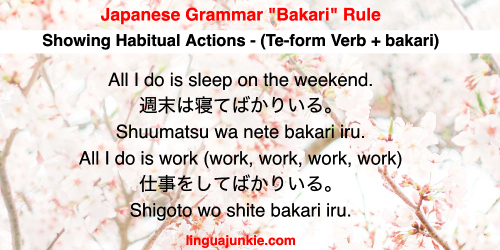
Another common way you’ll encounter bakari is with the te form. When used in this way, it shows habitual actions that someone is always or only doing. For example, if it has been a lazy day, you can use it to say that all you’re doing is sleeping. Or, all you usually do in Sundays is watch Netflix.
To form these sentences you can take the te form of the verb and add bakari. If we take the verb 寝る(neru), to sleep, and change it to te form it would be 寝て (nete). You can use this to say 寝てばかり (nete bakari), meaning “all you do is sleep”.
- All I do is sleep on the weekend.
- 週末は寝てばかりいる。
- Shuumatsu wa nete bakari iru.
- All my son does is eat.
- 息子は食べてばかりいる。
- Musuko wa tabete bakari iru.
- All I do is watch T.V. all day.
- 日中テレビを見てばかり。
- Ichinichi juu terebi o mite bakari.
- All she does is play outside.
- 彼女は外で遊んでばかりいる。
- Kanojo wa soto de asonde bakari iru.
- All I do is study every day.
- 毎日勉強してばかりいる。
- Mainichi benkyou shite bakari iru.
- All I do is work (work, work, work, work)
- 仕事をしてばかりいる。
- Shigoto wo shite bakari iru.
Rule #3 “Only Nouns” — Noun + bakari
“Linguajunkie’s blog only has text articles and that’s it. No videos.”
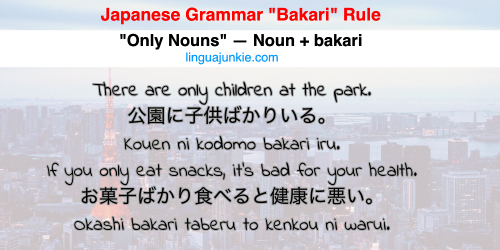
Bakari can also be used to mean “only” or that there is an abundance of something/someone. For example, if you were at a park and all you see are children, you can use this to say that there are only children at the park. This would be 子供ばかり (kodomo bakari). In this way, if you take a noun and add bakari, you can express situations where there is only or mostly one thing or type of person.
- There are only children at the park.
- 公園に子供ばかりいる。
- Kouen ni kodomo bakari iru.
- This store only has high schoolers.
- このお店は高校生ばかりいる。
- Kono omise wa koukousei bakari iru.
- If I only use the computer, I get tired.
- コンピューターばかりすると疲れる。
- Konpyuutaa bakari suruto tsukareru.
- If you only eat snacks, it’s bad for your health.
- お菓子ばかり食べると健康に悪い。
- -Okashi bakari taberu to kenkou ni warui.
- Women shouldn’t be the only ones doing housework.
- 女性ばかりが家事をするべきじゃない。
- Josei bakari ga kaji o suru beki janai.
Rule #4 “About/Approximately” — Counter word + bakari
“Linguajunkie took about 3 hours to write this Bakari Japanese Grammar guide.”
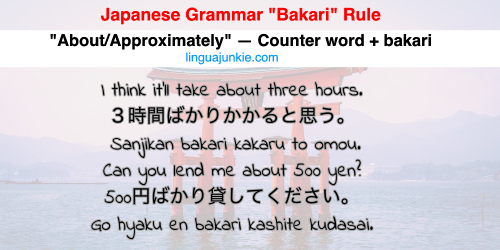
If you put a counter word before bakari, it can mean “about” or “approximately”. Counter words can include things like hours, days, prices, number of people, etc… It’s similar to the Japanese word ぐらい (gurai) but bakari is generally used less often than gurai.
- I think it’ll take about three hours.
- 3時間ばかりかかると思う。
- Sanjikan bakari kakaru to omou.
- Can you lend me about 500 yen?
- 500円ばかり貸してください。
- Go hyaku en bakari kashite kudasai.
- I think there will be about 6 people coming.
- 六人ばかり来ると思います。
- Rokunin bakari kuru to omoi masu.
- It will be about 1000 yen.
- 千円ばかりほどです。
- Senen bakari hodo desu.-
- Today I ran about thirty minutes.
- 今日は30分ばかり走りました。
- Kyou wa sanjuppun bakari hashiri mashita.
Rule #5 “All You Do is..” Dictionary form verb + bakari
“All Linguajunkie does is talk about languages. How annoying.”
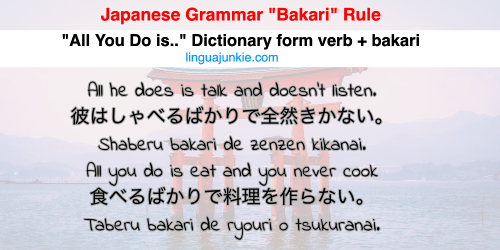
If you attach bakari to a dictionary form verb, you’ll get a phrase that is a general statement that doesn’t apply to a particular point in time. It still means “always” or “only”, but it’s less about habitual actions or a past action. Forming sentences with this grammar rule is easy. All you need is the dictionary form of the verb and attach bakari to the end.
- All he does is talk and doesn’t listen.
- 彼はしゃべるばかりで全然きかない。
- Shaberu bakari de zenzen kikanai.
- I only hope that things go well tomorrow.
- うまく行くことを願うばかりだ。
- Umaku iku koto o negau bakari da.
- I think the company is only going to be successful from now on.
- 会社はこれから成功するばかりだと思う。
- Kaisha wa korekara seikou suru bakari dato omou.
- My Japanese is only going to get better from now.
- これから日本語が上手になるばかりだ。
- Nihongo ga jouzu ni naru bakari da.
- All you do is eat and you never cook
- 食べるばかりで料理を作らない。
- Taberu bakari de ryouri o tsukuranai.
Rule #6 bakka / bakkari
This is simply a casual way to say bakari and it’s used in spoken Japanese. All you need to do is change bakari to bakka or bakkari. This is a nice way to make your Japanese sound casual and friendly. However, don’t use this form when you need to talk or write in a more polite way. It’s also not used when you want to say “about” or “approximately”.
So, long story short… for the 5 rules you learned above, this 6th rule is the casual form of the 5 bakari Japanese grammar rules.
- Hana is always sleeping.
- はなちゃんは寝てばっか。
- Hana chan wa nete bakka.
- I just went to the store a moment ago.
- さっきお店に行ったばっかり。
- Sakki omise ni itta bakkari.
- All the baby does is cry.
- 赤ちゃんが泣いてばっか。
- Akachan ga naite bakka.
- This restaurant only has meat.
- このレストランは肉ばっかり。
- Kono resutoran wa niku bakkari.
- If you only eat ice cream you’ll get a cavity.
- アイスクリームばっか食べると虫歯になるよ。
- Aisu kuriimu bakka taberuto mushiba ni naru yo.
Conclusion – Back to You.
Now, I hope you have a decent idea of how this grammar rule is used.
- Saying you just did something
- Expressing habitual actions like sleeping in on Saturdays
- Saying there are only certain things somewhere…
- Saying someone always does something
- Expressing approximation of size or amount
- And as a casual form.
If you want to practice, leave a comment.
If you want to save this page, go ahead and print it out.
Either way, thanks for reading and for learning Japanese with Linguajunkie.
Other grammar articles:
– The Main Lingua Junkie
